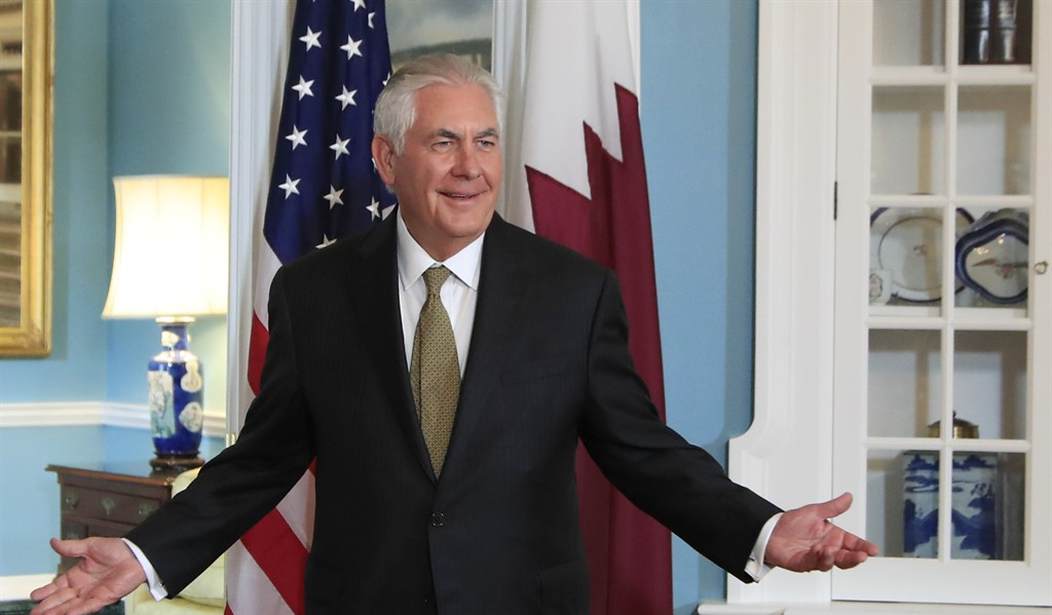Since when do department heads turn down money from Congress? Rex Tillerson may allow $60 million from Congress to slip out the hands of the State Department, but not necessarily for the purpose of saving money or shrinking government, Politico’s Nahal Toosi reports. Congress allocated the funds to expand US efforts to fight propaganda from hostile forces, including ISIS — and Russia. And there’s where the problems begin:
Secretary of State Rex Tillerson is resisting the pleas of State Department officials to spend nearly $80 million allocated by Congress for fighting terrorist propaganda and Russian disinformation.
It is highly unusual for a Cabinet secretary to turn down money for his department. But more than five months into his tenure, Tillerson has not issued a simple request for the money earmarked for the State Department’s Global Engagement Center, $60 million of which is now parked at the Pentagon. Another$19.8 million sits untouched at the State Department as Tillerson’s aides reject calls from career diplomats and members of Congress to put the money to work against America’s adversaries.
The $60 million will expire on Sept. 30 if not transferred to State by then, current and former State Department officials told POLITICO.
So what exactly does this mean? It’s clearly not a small-government initiative; the amount is too small for any significant reductions at State, and the money is earmarked by Congress for a specific purpose. Toosi’s sources claim that Tillerson feels that the timing isn’t right for a counter-propaganda push against Russia, as they want to work with Moscow on Syria and potentially other initiatives. That claim has led most of the analysis about the mysterious disinterest in the cash.
However, a $60 million counter-propaganda push would be a drop in the bucket compared to the sanctions passed by Congress on Russia. Trump signed it into law while promising major fights over its implementation earlier today, which far eclipses the $60 million grant issue either way it turns out. Tillerson noted Trump’s unhappiness with the bill, along with his own, but said that they would still try to improve relations with Moscow where possible:
Secretary of State Rex Tillerson says neither he nor President Donald Trump is “very happy” about new sanctions on Russia that Congress has voted to put in place.
But he says the sanctions show that Americans are frustrated by Moscow, even though they want the U.S. to have a functional relationship with the nuclear-armed power. …
Tillerson says the U.S. has had some successes working with Russia on lowering violence in Syria. Tillerson says he’ll meet with Russian Foreign Minister Sergey Lavrov during his trip to the Philippines starting Sunday.
Tillerson might need some help from Moscow in dealing with North Korea too, or at least with pressuring China into doing more to control Kim Jong-un. Both initiatives only got more complicated by Mike Pence’s encouragement of Georgia in seeking NATO membership, by the way. The US approach to Russia has gotten pretty schizophrenic, and Tillerson may need to have a meeting with all stakeholders before launching any other initiatives. (It’s also worth noting that the Obama administration took a pass on this project a couple of years ago, too.)
But is sensitivity to Russian feelings the reason for the reluctance to claim the funds, or is it more of the rushing on a project that has yet to be defined? Tillerson adviser and spokesman R.C. Hammond told Toosi it’s the latter, not an effort to kill off counter-propaganda programs:
Hammond said Tillerson hadn’t sought the $60 million because Global Engagement Center officials hadn’t offered a vision for how to spend it. “They put in a request in for additional funding. We asked them to map out a plan of how they would spend the money,” Hammond said.
But the former senior State official denied that was the case. He said the center’s leaders had crafted a spending plan after consulting with experts at the National Security Council, the Defense Department and those working in the regional bureaus of the State Department. Hammond and other Tillerson aides dismissed that effort, according to the former senior State official, saying that any such plan needed to be approved by the State Department’s policy planning office.
If Hammond’s telling the truth, then it might make sense not to accept the cash, as it would obligate State to account for it at the end of the budget cycle. On the other hand, how difficult is it to account for and return unspent earmarked funds? Granted, it’s probably been a long time since any government agency hasn’t spent money handed to it by Congress, but there has to be some procedure for reconciling such unused funds. Also, it may be that State hasn’t quite figured out how to tread when it comes to competing interests on Russia, but what about countering ISIS and other radical-jihadist propaganda efforts? That money would come in pretty handy for those efforts, and the strategies involved should have already been largely set over the last few years.
Even if the anonymous sources are correct, it doesn’t exactly sound as if Tillerson is opposed to counter-propaganda programs in general, even when aimed at Russia. It looks more like disorganization and odd prioritization, especially in light of a Congressional mandate to pursue this policy that was signed into law by the president. That’s dysfunction rather than malice, but the end result is still the same. Resources that should be going to fighting hostile propaganda are laying around doing no one any good.







Join the conversation as a VIP Member